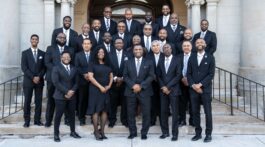Superstitions are beliefs that certain words, gestures, symbols, or objects are channels of supernatural power. These can be positive, like believing a rabbit’s foot brings you luck, or negative, such as that breaking a mirror brings bad luck. Of course, these things are not true. And having defined it so, most of us would say we don’t have any superstitions. But we do. When I was growing up, I was taught that we never put anything on top of the Bible.
“Wait a minute!” You may say. “That’s not a superstition! That’s just showing respect!” And it certainly may be. But I can remember while going to church school, another child spotted a Bible with a textbook on top of it in someone’s desk and said, “Oh! You put something on top of the Bible! Something bad can happen to you!” That, my friend, is superstition.
I certainly believe that disrespecting, disregarding, or ignoring the Bible can have negative results in a person’s life. But that’s very different from saying that inadvertently placing something on top of the Bible, or even putting something on top of it to protect it, will automatically bring punishment. Once again, that is superstition.
Now it’s true that very rarely do I see that precise form of superstition among Christians these days. But there’s another one I see quite commonly, and that concerns what I can only call “magic words.” For example, among certain traditionalist Christians today, the term “emerging church” or “emergent church” causes an immediate case of the vapors. Another such phrase would be “spiritual formation,” and it’s second cousin twice removed, “meditation.” Anything or anyone that uses such words, the superstition goes, must be dangerous, even evil.
On the progressive side of the equation — I confess I’m somewhat less familiar with this end of the spectrum — a word like “complementarian” can cause similar overreactions.
There are at least three problems with the allergic reaction some have to these words. The first problem is simply that not everyone uses these words in exactly the same way. A person may say that male and female are complementary while not, at the same time, believing in male headship. In fact, the idea of complementarity is inherent in the Hebrew phrase ezer kenegedo, which the King James version translates “helpmeet,” but more literally means “a helper suitable to him,” or even “strong partner.” Whatever it means, clearly in Genesis 2 it is an indication that the two of them, “the man” and “the woman” together can fulfill the divine commission to be fruitful and multiply, something that neither can do alone.
Similarly, a person can use the term “spiritual formation” simply to describe the process of becoming a disciple after baptism. We’re supposed to live a new type of life after baptism, a new spiritual life, and that requires different habits, different behaviors — and that developing process can easily be described as spiritual formation.
The second problem is like unto the first. While it is true that some of these phrases which cause great consternation may have a clear and precise academic definition, not everyone who uses them is familiar with those precise definitions. They may hear a phrase, not be aware of all of its implications in an academic setting, but use it because it describes what they are thinking about in general.
The third problem is in some ways more serious, because it indicates something unattractive about my own spiritual life. I will use the example of “the emergent church” for this. Suppose someone says that in this age of rapid technological change, increasing affluence around the world, higher levels of education, and rapid mobility, the church will have to adapt. Frankly, this seems obvious on the face of it. And I can give you lots of statistics and other indications that this is clearly true.
But suppose someone said, “Churches are in fact responding to this change, and a new Christianity is emerging.” And I, who agree with the basic statement but I’m not fond of many of the aspects within the “emerging church” movement, immediately jump to the conclusion that the person who said that is advocating the adoption of every practice utilized by the most extreme practitioners of the emerging church movement.
I have added assuming the worst about a Christian brother or sister to my superstitious reaction to the word “emerging.” I wish I could say otherwise, but I see this all the time. Seeing that Professor A says something about the church that is emerging in Latin America, superstitious critic labels the professor a heretic because he is really promoting “the emergent church agenda.”
Or seeing that Pastor B preaches that “God intended that male and female be complementary,” an advocate of women’s ordination says that Pastor B is promoting patriarchy and is opposed to women’s ordination and the equality of believers in Christ.
This sort of superstitious conclusion-jumping is tearing the church apart. Assuming the worst about brothers and sisters is a terrible vice. Accusing them falsely of heretical or controversial beliefs is sowing discord among brethren, one of the things that God hates (see Proverbs 6).
There is a relatively simple solution to this. But, of course, simple does not mean easy. We have got to — all of us — get over our superstitions about certain words or phrases, and start listening to and conversing with one another rather than throwing around accusations. There’s more to this process than can be put in one blog, so I will need to take it up again.










